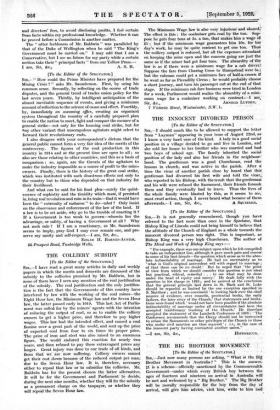THE COLLIERY SUBSIDY
[To the Editor of the SPECTATOR.] SIR,—I have read a great many articles in daily and weekly papers in which the merits and demerits are discussed of the subsidy to the collieries promised by Mr. Baldwin, but in none of them have I seen any mention of the real justification of the subsidy. The real justification and the only justifica- tion is the fact that the Governments of this country have interfered by law with the working of the coal mines—the Eight Hour law, the Minimum Wage law and the Seven Hour law, the latter passed early in 1919. This last Act of Parlia- ment was called for by the miners' agents with the intention of reducing the output of coal, so as to enable the colliery owners to get a higher price, and therefore to pay higher wages. This law had the intended effect, and caused 'a coal famine over a great part of the world, and sent up the price of exported coal from four to six times its proper price. The price of iron and steel was also 'raised to an enormous figure. The world endured this exaction for nearly two years, and then refused to pay these extravagant prices any longer. Great injury was done to our trade of all kinds,' and from that we are now suffering. Colliery "owners cannot get their cost down- because of the reduced output per man; due to the Seven HoUr law. It is, therefore, necessary either to repeal that law or to subsidize the. Collieriei. . Mr; Baldivin has for the present Chosen the latter alternative: It will be for the Government and Parliathent to decide; during the next nine nionthi, whether they will fix the subsidy as a permanent charge on the taxpayer, or whether they will repeat the SeVen Hour law.
The Minimum Wage law is also very injurious and absurd. The effect is this : the coalminer gets- coal by the ton. Sup- pose he gets four tons at 5s. a ton, that makes him a wage of 11 ; but if the minimum wage guarantees him 10s. for his day's work, he may be quite content to get one ton. Thui the -colliery output is reduced, but all the expenses attendant on keeping the mine open and the concern going are just the same as if the miner had got four tons. The absurdity of the law is as if there were a minimum wage for a cab driverP Suppose the fare from Charing Cross to Hampstead were 5s.1 but the cabman could get a minimum fare of half-a-crown if he went as far as Piccadilly Circus ; he would probably choose a short journey, and turn his passenger out at the end of that stage. If the minimum cab fare business were tried in London for a week, Parliament would realize the absurdity of a mini- mum wage for a coalminer working on contract. —I am;
7 Victoria Street, Westminster, S.W. 1. _










































 Previous page
Previous page